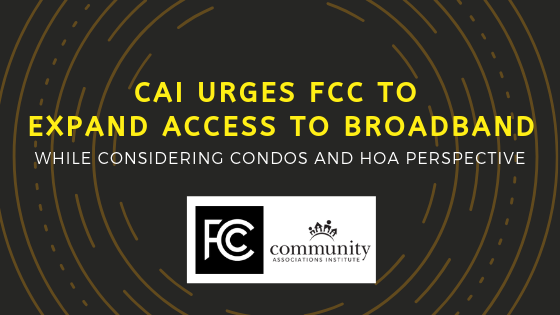The Federal Communications Commission released a notice of proposed rulemaking and declaratory ruling on improving competitive broadband access to apartments, timeshares, housing cooperatives, and homeowners associations.
According to the FCC, an important part of closing the digital divide is promoting high-speed broadband access for the millions of Americans who live and work in apartments, condominiums, and office buildings, which the commission calls multiple tenant environments (MTEs).
To provide service to tenants, communications service providers must have access to the building. But, when service providers know that they would have to share the communications facilities that they deploy with their competitors, they are less likely to invest in deployment in the first place. For decades, Congress and the FCC have encouraged facilities-based competition by broadly promoting access to customers and infrastructure—including MTEs and their occupants—while sharply limiting to only narrow circumstances any mandatory sharing requirements that reduce incentives to invest.
Following these principles, this notice of proposed rulemaking and declaratory ruling would take steps to promote facilities-based broadband deployment and greater consumer choice for Americans living and working in condominiums, housing cooperatives, and homeowners associations.
CAI members want to improve access to competitive broadband while protecting their community association assets and mitigating exposure to overreach by internet providers due to complex contracts.
Below is a summary of CAI’s comments to the FCC on this topic and a link to the full comment letter.
Access to Broadband Internet Services
CAI members routinely negotiate with communications service providers to ensure community association residents and homeowners have access to broadband internet service, multi-channel video programming service, and telephonic communications. CAI members support federal policy promoting competition for communications services, provided such policy respects the lawful management of community association common elements for the benefit of all association owners and residents.
Exclusive Marketing Arrangements
CAI members support the FCC’s decision to not revisit its 2010 determination concerning exclusive marketing arrangements. CAI agrees such arrangements do not harm consumers and can have important consumer benefits.
Exclusive Wiring Arrangements
CAI members believe exclusive wiring arrangements can benefit community association owners and residents if structured so the association’s ownership interest in common elements is clearly understood or uncompromised. Contracts combining company wiring with association-owned internal wiring into an exclusive use “system” deserve scrutiny to the extent that no alternate common element internal wiring system exists. Disposition or removal of abandoned wiring, particularly in instances where a provider has replaced an association-owned, home-run and/or home wiring system, remains a concern of CAI members.
Bulk Billing Arrangements
CAI members support bulk billing arrangements with communications providers. Such arrangements expand access to communications services, including broadband internet services, for all community association residents and owners, often at a discount.
Revenue Sharing Agreements
While revenue sharing agreements may be a factor in nonresidential or industrial multiple tenant environments, CAI members report such agreements are not typically present, in the manner described by the FCC, in the community association housing model.
Exclusive Rooftop Access Contracts
CAI members report exclusive access contract requests for rooftop broadband internet facilities are uncommon. In a similar manner, CAI members report exclusive rooftop access demands by communications providers are increasingly rare and, in general, condominium associations and housing cooperatives reject such contract proposals when proffered.
Find the full comment letter filed by CAI here.




Very relevant article. I am happy to see CAI commenting on this on behalf of our Condo Owners. Thank you for sharing.
Hello Dawn;
I am a CAI certified PM and have a question regarding the homeowners Association in which I live in. Recently the Board put out a ballot in which they are forcing owners to submit to a contract with an internet carrier for ten years. I do not use this carrier currently and not only did they enter into the contract for all homeowners to be a part of and pay but they also are making empty lots pay a different amount then homeowners. My questions are: Can I be forced to change providers and can they get into a contract for single family home HOA’s?
Every community association has their own governing documents that outline homeowner requirements. Consult with your association’s attorney to find out more about the legality the board’s decision and the extent to which you are required to comply.